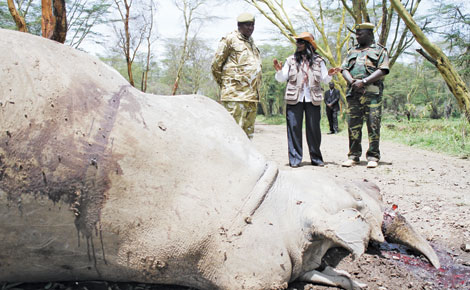 |
Environment Cabinet Secretary Judy Wakhungu (centre) and senior KWS officers at the scene where a rhino was killed by poachers at Lake Nakuru National park, on Friday. [PHOTOS: BONIFACE THUKU/ STANDARD]
|
By KIBIWOTT KOROSS and MWANIKI MUNUHE
Kenya: Private ranches and community conservancies have accounted for three quarters of poaching cases in the last nine years.
Of the 18 rhinos killed this year, 16 were from private ranches and conservancies while the others in national parks. In the past nine years some 1,752 elephants and 182 rhinos were either killed or died through natural cause according to Kenya Wildlife statistics obtained by The Standard on Saturday.
Some 1,407 elephants in private ranches and conservancies were killed while 345 in KWS protected parks. The private ranches lost 116 rhinos through poaching while 66 were killed in parks. There are more than 140 private ranches and community conservancies occupying more than 15 million acres across 19 counties.
This now raises questions whether private ranches, community conservancies’ and KWS have the ability to protect the elephants and rhinos in the country.
Despite of the new anti-poaching laws that stipulate hefty fines or life imprisonment for offenders, six rhinos were killed in the last one week.
There are 1,041 rhinos left in the country with more than half of them in private ranches and conservancies.
“These deaths are rampant in Laikipia where there are private ranches. These ranches have been unable to contain poachers. There are many poachers in the area with sophisticated weapons and the ranches lack enough employees. The situation is dire at Mugie Ranch, Ol Jogi Ol Pejeta and Ngulia,” said KWS Director William Kiprono.
Some three rhinos have been poached in Ol Jogi and another two in Solio while two were killed in Ol Pejeta and Ngulia respectively.
Security officers in KWS parks and the private ranches have been accused of colluding with poachers to kill elephants due to high demand for ivory and rhino horns in Asia. The spate of poaching, conservationists say, is carried out by those who are closely associated to the animals; especially the elephants.
The animals, they say recognise the green KWS jungle gear and often take anybody in such attire as a friend.
“Poachers wear military gear and elephants think they are KWS officers,” said Daniel Leteiyo, a manager at Westgate conservancy in Samburu.
 The Standard Group Plc is a
multi-media organization with investments in media platforms spanning newspaper
print operations, television, radio broadcasting, digital and online services. The
Standard Group is recognized as a leading multi-media house in Kenya with a key
influence in matters of national and international interest.
The Standard Group Plc is a
multi-media organization with investments in media platforms spanning newspaper
print operations, television, radio broadcasting, digital and online services. The
Standard Group is recognized as a leading multi-media house in Kenya with a key
influence in matters of national and international interest.
 The Standard Group Plc is a
multi-media organization with investments in media platforms spanning newspaper
print operations, television, radio broadcasting, digital and online services. The
Standard Group is recognized as a leading multi-media house in Kenya with a key
influence in matters of national and international interest.
The Standard Group Plc is a
multi-media organization with investments in media platforms spanning newspaper
print operations, television, radio broadcasting, digital and online services. The
Standard Group is recognized as a leading multi-media house in Kenya with a key
influence in matters of national and international interest.









